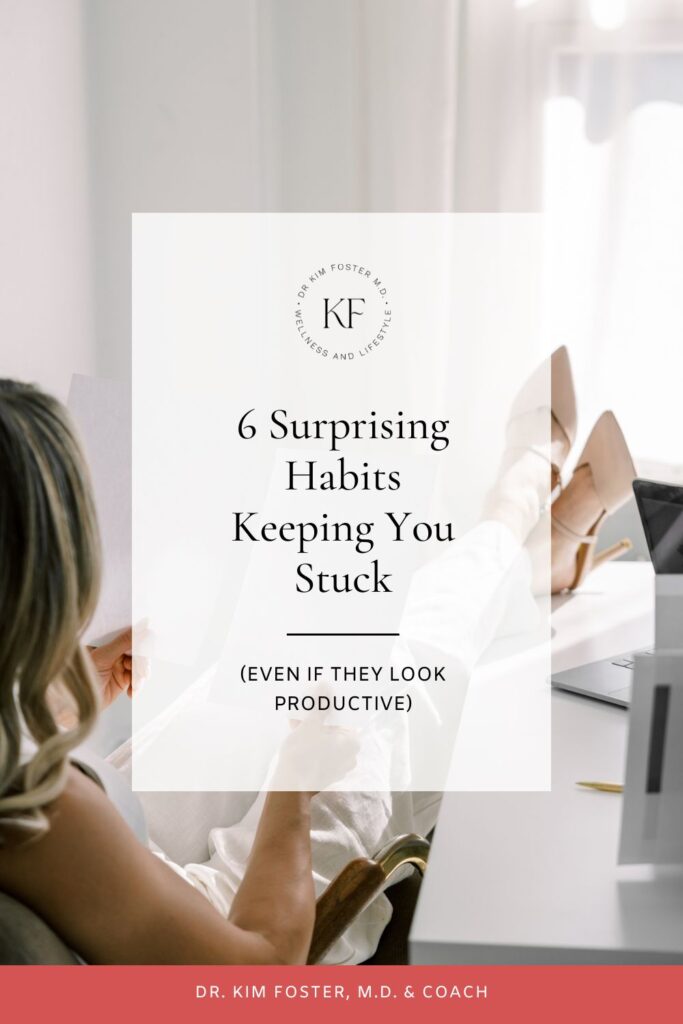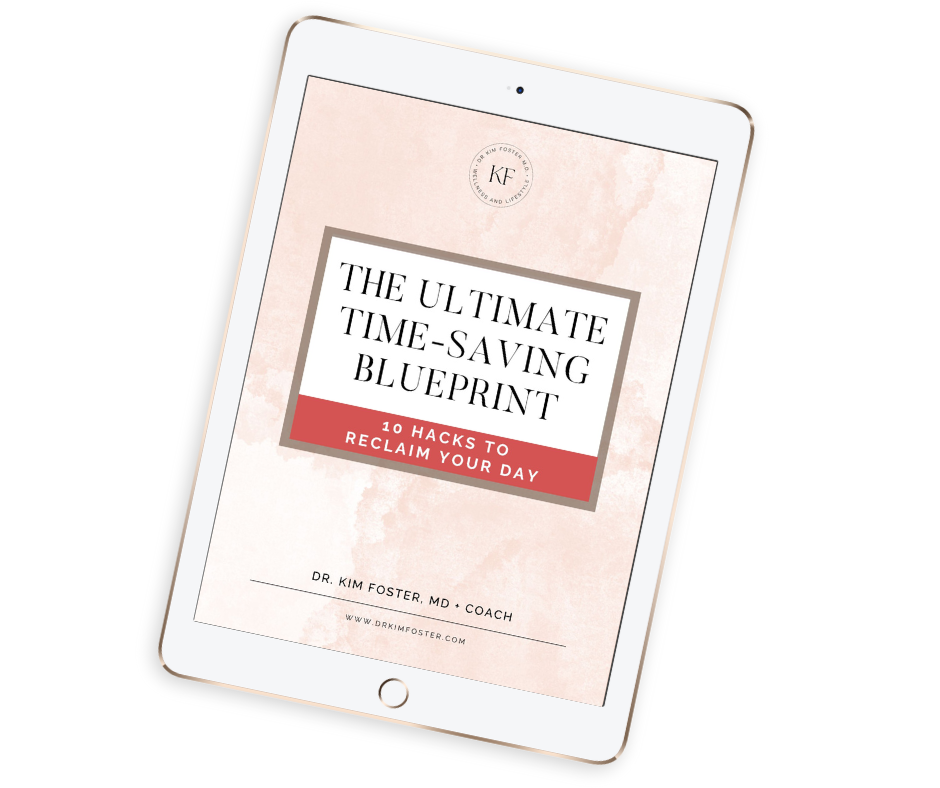You’re doing all the right things—Waking up early, writing in your journal, blocking every hour in your calendar.
From the outside, it looks like you’ve mastered the art of personal growth.
But on the inside, you’re exhausted. Despite all your efforts… you’re not getting where you want to go.
I’ve seen this countless times.
As a doctor, I worked with driven, high-functioning people who were doing everything “by the book” but still felt stuck.
Not because they weren’t working hard. But because, the very habits they relied on for success were quietly draining their energy, clarity, and sense of self.
So, in this article, we’re flipping the script.
Let’s talk about the habits that seem helpful—but might actually be holding you back. And more importantly, what to do instead.
1. The Hustle-Culture Morning Routine
You’ve seen it all over Instagram—The perfect morning routine…
Wake up at 5 am, ice bath, breathwork, green juice, meditation, workout, journaling… all before sunrise.
Now, I’m not against a good morning routine. But if your “routine” is robbing you of sleep and adding more pressure than peace, it’s not helping.
Research shows that even modest sleep deprivation (just 1.5 hours less per night) reduces focus, increases anxiety, and affects your long-term health.
And in my years as a doctor, I saw the ripple effects of sleep debt constantly:
- Elevated cortisol
- Weakened immunity
- Hormonal imbalance
No smoothie, supplement, or sunrise meditation can undo that.
Try this instead:
Choose a morning anchor—one simple ritual that helps you feel grounded. For me, it’s ten minutes of gentle yoga before coffee. That’s it.
2. Over-Scheduling Your Entire Day
Color-coded calendars, 15-minute blocks, every hour accounted for…
Granted, rigid scheduling looks impressive, but it’s often a recipe for burnout. Because here’s what no one tells you…
Life doesn’t follow your Google Calendar.
When something unexpected happens (and it always does), your perfectly planned day collapses. One unexpected email, a sick kid, or an energy crash is all it takes to make you feel behind or like you’ve failed.
Life is constantly shifting, so what you actually need is flexibility, not rigidity.
Try this instead:
Spacious structure.
Rather than planning your entire day, set clear start and end times, along with 1 or 2 non-negotiable tasks. The rest should be ‘nice to-dos’ tasks based on your energy and how the day unfolds.
3. Journaling Through Every Problem
I love journaling. However, I’ve also seen how easily it can turn into emotional rumination. And when journaling becomes a loop of self-criticism, reliving failure, or rehashing old wounds, it’s not healing; it’s rehearsing pain.
Repetitive negative thinking has been linked to higher rates of anxiety and depression. And this is true for continuously writing these thoughts, not just thinking about them.
In fact, as one of my favorite quotes goes: “Writing helps you see the story. But healing happens when you change the story.”
Try this instead:
Shift from rumination to reflection by asking empowering questions:
- What is this emotion trying to teach me?
- What truth have I been avoiding that’s quietly asking to be heard?
- What would I choose if I believed I was already enough?
- What’s the smallest next step I can take from a place of self-trust?
4. Forcing Gratitude When You’re in Survival Mode
Gratitude is powerful. It’s linked to improved mental health, reduced anxiety, and lower stress hormones.
However, what’s not often talked about is this: when used to silence real pain, gratitude can become toxic.
When I worked as a family doctor, I would often see this, especially in women.
They would come in overwhelmed and burnt out, yet they would dismiss their pain, saying something like, “I shouldn’t complain. I have a good life.”
Here’s the truth we all need to realize: You can be grateful and be struggling at the same time.
Saying “others have it worse” not only invalidates your emotions, it suppresses them. And research shows that suppressing negative emotions:
- Increases stress reactivity
- Aggravates mental health issues like depression and anxiety
- Increases the risk of physical health issues and early mortality
Try this instead:
Rather than forcing gratitude, let truth and gratitude coexist:
- “I’m grateful for this opportunity… and I’m overwhelmed by the pressure.”
- “I love being a parent… and sometimes I miss who I was before.”
- “I appreciate having a steady income… and I know I’m meant for something more.”
- “I’m lucky to have support… and I still feel lonely.”
5. The Wellness Perfectionist Trap
Wellness used to be simple: eat well, move your body, and get enough sleep.
Now it’s a never-ending checklist of perfection: seed cycling, lymphatic drainage, organic-only, biohacking supplements, 10K steps before noon…
Wellness has become more exhausting than rejuvenating, and ironically, it’s making people less healthy.
Studies have linked rigid wellness routines to disordered eating, elevated stress, and obsessive behavior.
For example, excessive use of diet and fitness apps increases competitive comparison, feelings of failure, and emotional distress.
Try this instead:
Regularly check in with your wellness practices to determine if they are still serving you. Ask questions like:
- Is this nourishing me, or is it just stressing me out?
- Would I still do this if no one saw it on Instagram?
- Am I doing this because it feels good or because I feel like I “should”?
6. Overthinking Your Next Move
We all like to feel prepared. But overplanning can actually stall progress.
If every time you make a decision, you dive into ‘planning mode’— creating pros and cons lists, listening to podcasts, and researching your options for the hundredth time —you might be caught in what I call the ‘illusion of progress.’
What you’re doing feels productive, but nothing’s actually changing. You’re stuck in mental loops of gathering information and calling it action.
Why does it happen? Because your brain craves certainty.
When you’re scared of change, your mind goes into overdrive, trying to calculate every outcome, minimize every risk, and find the “perfect” next step before you make a move.
But here’s the truth: reinvention doesn’t start with clarity—it starts with motion.
Try this instead:
Small action builds momentum, and momentum creates clarity. Neuroscience shows that taking action (even small, uncertain action) activates the brain’s motivation and reward centers, increasing dopamine and creating forward momentum.
So, if you want real clarity, ask yourself:
What’s one small action my future self would thank me for today?
Send the email. Book the class. Have a scary conversation. Do one small thing your future self would thank you for.
Final Thoughts
If you’re realizing now that you’ve been stuck, not because you’re lazy, but because you’ve been chasing the wrong kind of “progress,” you’re not alone.
These patterns often look productive on the outside. But inside, they can quietly drain your energy, dim your clarity, and keep you from moving forward.
In this week’s YouTube video, I dive even deeper into these six habits and share a bonus one.
Watch the full episode here:
Now I’d love to hear from you—
Which of these habits have you found yourself stuck in?
There’s zero shame (we’ve all been there). But there’s real power in naming what you’re ready to let go of.
So share it in the comments and take the first step to setting yourself free!
Resources:
- The Reset Challenge – FREE 5-Day Challenge To Reclaim Your Energy, Focus & Mindset
- The WellPlanned Method – Master Your Goals With The WellPlanned Goal Planner
- My Free Class for Health Coaches: How To Build A 6-Figure Health Coaching Business Using One Signature Program
- Dr. Kim on Instagram: https://www.instagram.com/drkimfoster/
Download my FREE Ultimate Time Saving Blueprint

FREE CLASS!
Looking to take your wellness journey to the next level?
The 3 Secrets For Stepping Into A Meaningful New Career Without Wasting Time Or Money
- find out why health & wellness coaching is a skyrocketing industry that can provide the freedom and fulfillment you’ve been craving
- discover the 3 biggest myths about health & wellness coaching that will hold you back (and what the truth is instead)
- learn the secret sauce for getting amazing results for your clients (and building a profitable business as a wellness coach)
…and more!








